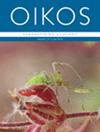寄生对一种底栖工程物种活动的密度依赖效应:对生态系统功能的潜在影响
IF 3.1
2区 环境科学与生态学
Q2 ECOLOGY
引用次数: 0
摘要
寄生是地球上一种常见的生活方式,但其对海洋生态系统功能的重要性却长期被忽视。特别是,寄生虫通过对作为生态系统工程师的宿主的影响,具有影响中心生态过程的巨大潜力。我们采用原位实验的方法,探讨了吸虫对欧洲大西洋软底海岸线上常见的一种丰富双壳贝类--胡椒沟贝(Scrobicularia plana)的工程生物扰动活动的影响,以及对沉积物-水界面(SWI)营养交换的连锁反应。线虫对宿主运输沉积物颗粒和溶质的能力产生了负面影响,其影响程度与密度有关,寄生虫负担占个体间差异的 22-31%。这可能是由于寄生虫损害了双壳贝的生理状态和钻穴能力,因为我们观察到随着寄生虫数量的增加,双壳贝的状态指数和钻穴深度都有所下降。相比之下,寄生虫对底栖生物地球化学通量的影响在短时间内并不会随着寄生虫数量的增加而发生显著变化。在这里,我们只关注了吸虫对刨花水母行为的影响,因此排除了其他大型底栖生物。下一步,我们应检验吸虫是否会改变以刨腹鱼为主的底栖生物群落的结构和功能,以便更好地了解和量化寄生虫在沿岸软底环境中的工程作用。本文章由计算机程序翻译,如有差异,请以英文原文为准。
Density‐dependent effects of parasitism on the activity of a benthic engineer species: potential impact on ecosystem functioning
While parasitism is a common lifestyle on Earth, its importance for the functioning of marine ecosystems has been overlooked for a long time. In particular, parasites have significant potential to influence central ecological processes through their impacts on hosts that serve as ecosystem engineers. Using an ex situ experimental approach, we explored the effects of trematode parasites on the engineering bioturbation activity of a common and abundant bivalve along European Atlantic soft‐bottom coastlines, the peppery furrow shell Scrobicularia plana, as well as knock‐on effects for nutrient exchanges at the sediment–water interface (SWI). Trematodes negatively impacted the host's ability to transport sediment particles and solutes in a density‐dependent way, with parasite burden explaining 22–31% of the inter‐individual variability. This could be explained by parasitism impairing the bivalve physiological state and ability to burrow, as we observed a decrease in the condition index and the burrowing depth of the bivalves with an increase in the number of parasites they host. In contrast, the influence of S. plana on benthic biogeochemical fluxes did not vary significantly according to parasitic burden over a short time scale. Here, we focused on the effects of trematode parasites on the behaviour of S. plana alone, and thus excluded other macrofaunal organisms. We should next test whether trematodes modulate the structure and functioning of benthic communities dominated by S. plana to better understand and quantify the engineering role of parasites in soft‐bottom coastal environments.
求助全文
通过发布文献求助,成功后即可免费获取论文全文。
去求助
来源期刊

Oikos
环境科学-生态学
CiteScore
6.20
自引率
5.90%
发文量
152
审稿时长
6-12 weeks
期刊介绍:
Oikos publishes original and innovative research on all aspects of ecology, defined as organism-environment interactions at various spatiotemporal scales, so including macroecology and evolutionary ecology. Emphasis is on theoretical and empirical work aimed at generalization and synthesis across taxa, systems and ecological disciplines. Papers can contribute to new developments in ecology by reporting novel theory or critical empirical results, and "synthesis" can include developing new theory, tests of general hypotheses, or bringing together established or emerging areas of ecology. Confirming or extending the established literature, by for example showing results that are novel for a new taxon, or purely applied research, is given low priority.
 求助内容:
求助内容: 应助结果提醒方式:
应助结果提醒方式:


